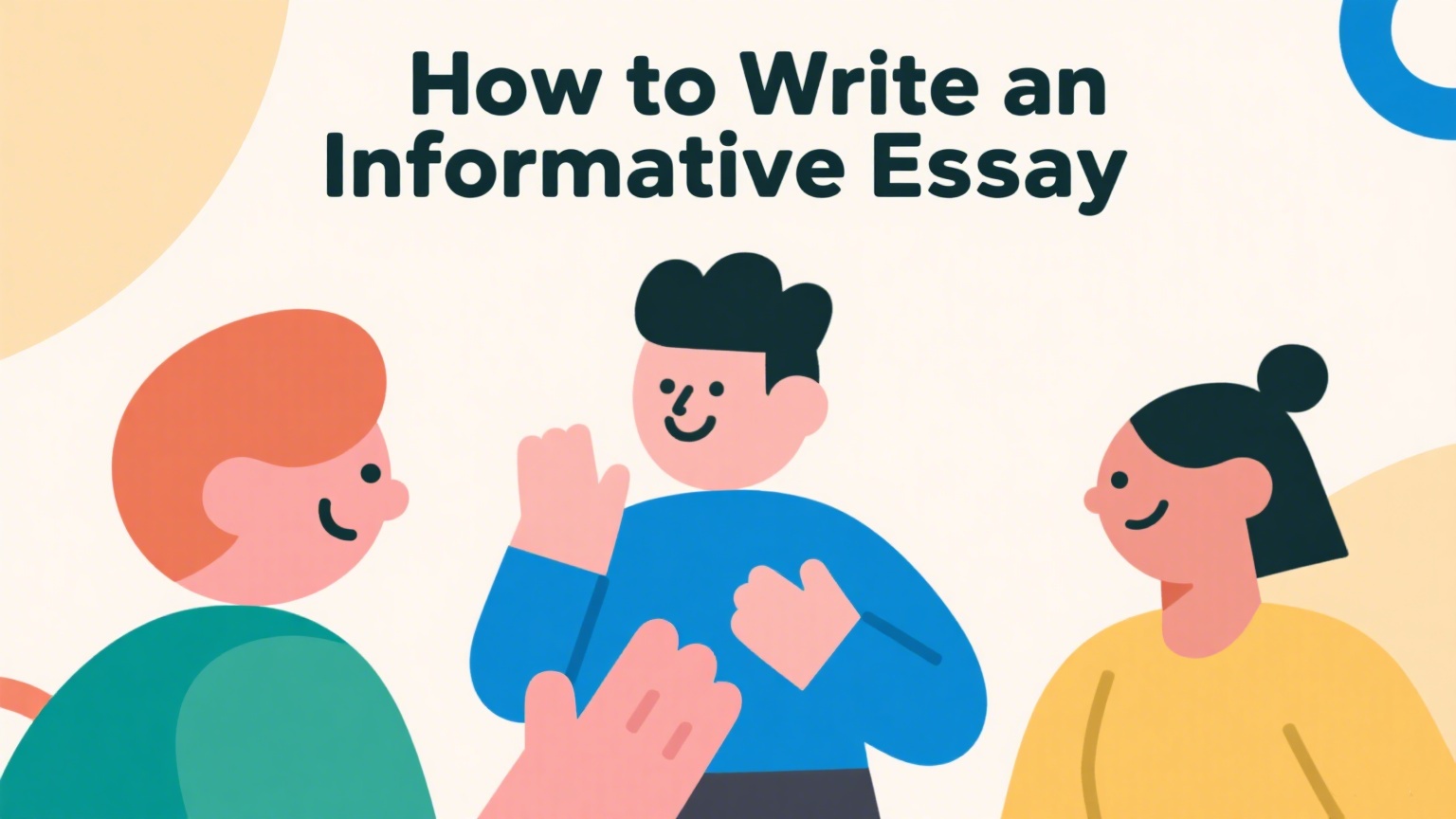如何撰写信息性文章:专家指南与技巧

撰写信息性文章乍一看似乎很简单。但是,要创造出真正能够教育和吸引读者的内容,需要技巧、策略以及对受众需求的理解。无论你是学生在完成作业,还是专业人士在开发教育内容,掌握如何撰写信息性文章都是有效沟通的关键技能。
理解信息性文章的基础
信息性文章有多种形式;有的可能解释一个系统的工作原理,分析数据,总结一个事件,比较两个或更多的主题,或者逐步引导读者了解一个过程。与反应性文章、反思性文章和叙述性文章不同,信息性文章完全是客观的。这种客观性使它们与其他类型的论文不同,如辩论性文章,并要求对研究、组织和呈现采取特定的方法。
当你学习如何撰写信息性文章时,主要目标是在不插入个人意见或偏见的情况下教育你的受众。信息性文章通过关于主题的新、有趣且常常令人惊讶的事实和细节来吸引读者。在掌握如何撰写信息性文章时,请记住,这些文章是教育性的;读者期望学到新东西。这种理解使你有责任为你的观众提供有价值的材料。
打造引人注目的引言
你文章的入口是你的开场段落,因为它吸引了你的读者。你可以在第一句话中使用一个意想不到的事实、一句引语或一个关于你主题的简短轶事来吸引读者的注意。你的钩子应该在呈现你的一般主题的同时,也表达出对你接下来要说的话的兴趣。(更多细节请参见我们的文章如何为文章写一个钩子。)
在吸引读者注意后,提供任何必要的背景信息,以帮助你的读者理解你的主题。这些背景信息应该引导到你的论文陈述,这是你引言中最重要的部分。你的论文陈述应该清楚地告诉读者你的论文将涵盖哪些具体主题。记住,你的论文并不提出论点,而是描述你的论文将传达哪些信息以及如何传达。
发展有力的主体段落
你的信息性文章的主体是你兑现论文陈述承诺的地方。以主题句开头:你的读者应该立即知道段落将讨论什么。支持它:事实、统计数据、专业意见;任何有助于你证明观点的内容,都应该在你的文章中使用。每个段落应该集中在一个支持你整体论文的主要观点上。
每个主体段落都应该有一个主题句,然后由证据、例子和解释支持。每个观点都应该有一个过渡,以保持段落的连贯性,并让读者理解逻辑。写主体段落的艺术是足够详细,而不让读者陷入令人困惑的细节中。
用来自可信来源的证据支持你的观点,如学术研究、领域专家和可信出版物。证据应该多样化,以保持读者的兴趣。统计数据可以与案例研究搭配,专业人士的引语可以与现实世界的例子搭配,技术解释可以与实际应用搭配。
避免常见陷阱
许多作家在撰写信息性文章时努力保持客观性。抵制插入个人意见或对你主题的价值或重要性进行争论的诱惑。相反,清晰地呈现信息,让读者自己得出结论。
另一个常见错误涉及选择过于宽泛的主题范围。专注于你主题的具体方面,而不是试图涵盖一切。例如,不要写关于“气候变化”,而是将焦点缩小到“海平面上升对沿海生态系统的影响”。这种具体性允许更深入的探索和对你读者更有意义的学习。
组织问题也困扰着许多信息性文章。当学习如何有效地撰写信息性文章时,创建一个组织你收集的信息的大纲。以一个吸引读者的引言开始,介绍主题,并提出论文陈述。将主体段落划分为支持论文的逻辑部分。这个计划阶段防止了漫无目的的写作,并确保了你的文章逻辑流畅。
研究和事实检查
为了掌握信息性文章写作,首先必须学会如何进行研究。研究充分的文章更成功、更有影响力,研究越好,你的文章就越强。首先使用简单的来源来了解你主题的广度,然后细化你的研究,包括更微妙和具体的信息,以扩展你的论文。各种类型的来源将加强你的文章:一手资料用于第一手信息,二手资料用于分析和解释,三手资料用于背景信息。
事实检查你的研究也很重要。从多个可信来源比较信息,特别是统计数据和热点话题。在研究过程中做笔记,包括每个来源的引用信息。这将使起草过程更加顺利,并确保你正确地引用了你的来源。
整合所有内容
撰写有效的信息性文章不仅需要实践,还需要密切关注细节,以及对读者教育需求的承诺。始终清晰、客观、有组织地呈现你经过充分研究的信息,并确保它真正为你的受众带来价值。无论是学术作业还是专业内容,最重要的原则都适用于这两种情况,如大学论文,需要关注结构和参与度的细节。
当你提高写作技巧时,考虑使用可以帮助确保你的内容保持自然、吸引人的语调的工具。例如,GPTHumanizer可以帮助作家改进他们的学术内容,使其听起来更自然、更会话化,同时保持教育价值和适当的学术标准。
常见问题解答
信息性文章与其他形式的文章相比有何独特之处?与其他类型的文章不同,它们的首要目的是在某个主题上教育读者。它不呈现任何偏见、判断或争论。它们的内容是客观的,纯粹基于事实。
信息性文章应该多长?这取决于你的作业或目的。大多数信息性文章大约是500-2000字。最重要的提示是你的工作应该充分通知你的读者。尽量不要添加太多重复的细节,只是为了增加字数。
如何撰写信息性文章的关键步骤是什么?缩小主题,研究,概述,撰写强有力的引言和论文,支持主体段落的证据,以及适当的结论总结关键点。
我可以在信息性文章中使用第一人称代词吗?通常,避免在信息性文章中使用第一人称代词(我、我、我的)以保持客观性。使用第三人称视角,关注信息而不是你与它的个人关系。
我应该为研究使用多少来源?来源的数量取决于你文章的长度和复杂性。对于较短的文章,目标是至少使用3-5个可信来源,更全面的作品需要额外的研究来充分支持所有主张。
哪些主题最适合信息性文章?选择一个有大量事实信息和真正教育价值的主题。科学过程、历史事件、社会现象、技术或技术发展,或关于复杂系统或过程的细节,都是信息性文章的好选择。对复杂概念的解释也会奏效。
